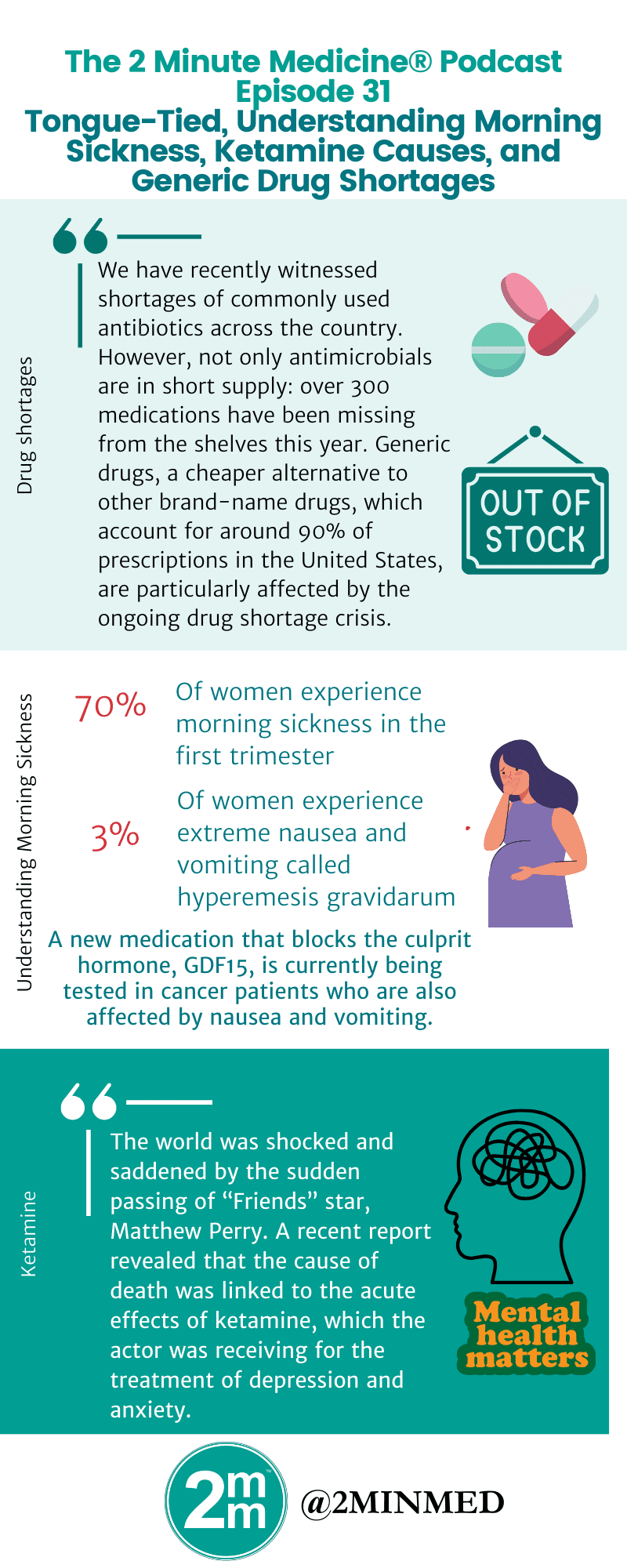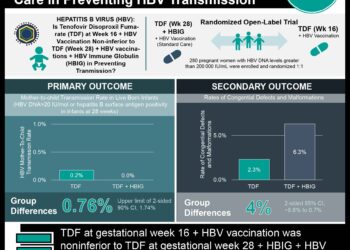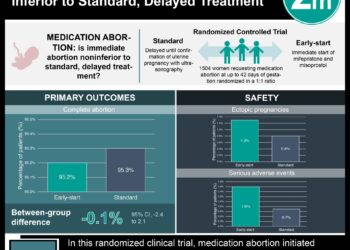The 2 Minute Medicine Podcast Episode 31
December 28th 2023
Welcome to the 2 Minute Medicine Podcast, summarizing the latest medical studies, curated and written by practicing physicians. On this podcast, twice a month, we cover the latest in healthcare news and research evidence.
Our episode is live!
Episode Description
We begin this episode by discussing our article of the week from Annals of Internal Medicine and is entitled “Cardiovascular health of middle-aged US adults by income level, 1999 to March 2020: A serial cross-sectional study.” In the second half, we begin by discussing an increasingly popular procedure used in infants who are struggling with breastfeeding. Then we delve into the new findings that a hormone, GDF15, is linked to morning sickness. After this, we discuss ketamine, the drug that was implicated in the tragic passing of ‘Friends’ star Matthew Perry. Finally, we end with a conversation about the ongoing generic drug shortages occurring across the country.
Click here to listen to this episode on Apple podcast
Click here to listen to this episode on Spotify
Transcript
[Deepti] Welcome to the 2 Minute Medicine Podcast, summarizing the latest medical studies, curated and written by practicing physicians.
For our full suite of daily medical study summaries and updates written by practicing doctors, please visit our website at 2minutemedicine.com to start reading new daily content right now, for free. On this podcast, twice a month, we cover the latest in health care news and research evidence. We are your hosts Deepti and Andrew. On today’s episode, we’ll start by discussing our two articles of the week. In the second half of the episode, we will look at health issues that have arisen in popular media.
[Andrew] Our article of the week comes from Annals of Internal Medicine and is entitled “Cardiovascular health of middle-aged US adults by income level, 1999 to March 2020: A serial cross-sectional study.”
There have been significant increases in cardiovascular mortality among middle-aged adults in the United States over the past decade. Income inequalities have significantly worsened in the country and concerns that the deaths have disproportionately affected the lower-income subset of this age demographic have increased. Yet, few studies have explored income-based differences in the burden of cardiovascular risk factors over the past two decades. Hence, this cross-sectional study aimed to investigate national trends in the prevalence, treatment, and control of cardiovascular risk factors among low-income and higher-income middle-aged adults from 1999 to March 2020. All participants aged 40 to 64 years who completed the National Health and Nutritional Examination Survey (or NHANES), a series of nationally representative surveys conducted every two years by the Centers of Disease Control and Prevention, during this period were identified. Treatment of hypertension, diabetes, and hyperlipidemia was defined as the self-reported use antihypertensive, antidiabetic, and cholesterol-lowering medication, respectively. Following the analysis of a study population which included 20,761 middle-aged adults, the prevalence of hypertension, diabetes, and cigarette use was consistently higher among low-income adults between 1999 and March 2020. Low-income adults exhibited an increase in hypertension from 37.2% (95% Confidence Interval [CI], 33.5% to 40.9%) to 44.7% (CI, 39.8% to 49.5%) but no changes in diabetes or obesity during the study period. Contrastingly, higher-income adults did not exhibit a change in hypertension but increases in diabetes from 7.8% (CI, 5.0% to 10.6%) to 14.9% (CI, 12.4% to 17.3%) and obesity from 33.0% (CI, 26.7% to 39.4%) to 44.0% (CI, 40.2% to 47.7%). Low-income adults also demonstrated higher but stable cigarette use (33.2% [CI, 28.4% to 38.0%] to 33.9% [CI, 29.6% to 38.3%]) compared to their higher-income counterparts, whose cigarette use decreased over the study period (18.6% [CI, 13.5% to 23.7%] to 11.5% [CI, 8.7% to 14.3%]).
In summary, this study demonstrated that low-income middle-aged adults exhibited higher rates of hypertension, diabetes, and cigarette use than their higher-income counterparts over the past two decades. Moreover, the prevalence of hypertension increased in low-income middle-aged adults while that of diabetes and obesity increased in their higher-income counterparts during this period. The study was limited by smaller sample sizes and the NHANES used to gather participant data, which did not assess for all relevant social determinants of health and may have been susceptible to recall and response biases.
[Andrew] Now for The Scan.
The Story: A procedure called frenotomy—where the frenulum (the tissue connecting the gums and underside of your tongue) is cut to allow for unrestricted movement of the tongue—is making headlines for its use in infants who are having difficulties with breastfeeding. However, a recent New York Times investigation has the public questioning whether the procedure, better known as a “tongue tie release” is beneficial in improving breastfeeding. Let’s take a closer look at this.
[Deepti]: That’s right. When an infant has an abnormally short or taut frenulum, breastfeeding can be impaired due to restricted movement of the tongue. Tongue tie releases have become increasingly popular over the years with new mothers who are struggling with breastfeeding. Celebrities such as Chrissy Teigen and model Heather Rae El Moussa have recently shared their experiences with the procedure in their infants. However, while the procedure is aimed at improving feeding, there have been accounts of pain, dehydration, and refusal to eat in infants who undergo these procedures. In fact, research into the area has not been able to point to a consistent benefit of the procedure on feeding in infants.
While the jury is still out on tongue tie releases, breastfeeding troubles remain prominent—approximately 70% of mothers experience difficulties when trying to breastfeed. To learn more about this please visit our website and check out the full issue of the Scan.
[Andrew] A recent study in Nature may have uncovered the cause of morning sickness in pregnancy. A hormone called GDF15 was identified as a risk factor for morning sickness. The study found that the hormone levels were directly correlated with the severity of symptoms in pregnancy. This comes as great news for the approximately two-thirds of women who experience morning sickness during their pregnancy.
While morning sickness is not uncommon during pregnancy, a small percentage of patients experience extreme nausea and vomiting called hyperemesis gravidarum. In this condition, pregnant patients experience excessive and uncontrollable vomiting, which can lead to dehydration and weight loss and pose several risks to both the mother and fetus. Fortunately, a new medication that blocks the culprit hormone, GDF15, is currently being tested in cancer patients who are also affected by nausea and vomiting. Morning sickness is largely understudied and misunderstood by researchers and patients alike, despite public attention around the condition from celebrities like Kate Middleton and Amy Schumer. The latest findings about GDF15 provide hope that one day, expecting mothers will have a treatment for their morning sickness woes. Next, let’s discuss how the world was shocked and saddened by the sudden passing of “Friends” star Matthew Perry a few months ago. A recent report revealed that the cause of death was linked to the acute effects of ketamine, which the actor was receiving for the treatment of depression and anxiety.
[Deepti] Ketamine is classified as a dissociative anesthetic drug, which can temporarily alter a person’s perceptions. The medication is better known for its recreational use but is also used for treatment-resistant depression. Perry was vocal about the mental health and substance use struggles he faced throughout the years. Although medications like ketamine and other psychedelic drugs can be ground-breaking for those with difficult-to-treat mental health conditions, they do not come without their risks: the triggering of manic episodes or seizures are just some of the concerns associated with the medications. Autopsy reports found that the amount of ketamine in Perry’s blood was approximately ten times higher than the normal therapeutic dose and there were other medications in his system at the time. Many are concerned that the tragic passing of Matthew Perry will result in public fear of using ketamine, resulting in stigma that may prevent people from accessing the benefits of the drug. Last but not least, let’s have a conversation about how we have recently witnessed shortages of commonly used antibiotics across the country. However, it’s not only these antimicrobials that are in short supply: over 300 medications have been missing from the shelves this year.
[Andrew] That’s right. Generic drugs, a cheaper alternative to other brand-name drugs, which account for around 90% of prescriptions in the United States, are particularly affected by the ongoing drug shortage crisis. Causes of these shortages can be linked to increased demand, especially for new drugs efficacious in weight loss, such as Ozempic and Wegovy, manufacturing delays, and more.
Unfortunately, the drug shortages are reaching a frightening new level: common chemotherapies are no longer accessible to patients. Two common anti-cancer drugs, carboplatin and cisplatin, are running low, leaving some patients without the necessary treatments to curb their cancer. While nobody needs a reminder of the severity of cancer, the recent news of Brooklyn Nine-Nine star Andre Braugher tragically passing at the age of 61 from lung cancer further highlights the risk of cancer and the need for adequate treatments to improve the lifespan and quality of life for cancer patients. Making sure chemotherapies remain accessible will be a top priority for healthcare institutions and governments heading into the new year.
We’d like to acknowledge the following members of our team for their contributions to this week’s episode
- Ashley Jackson
- Junghoon Ko
- Kiera Liblik
Thank you for joining us today for this episode of the 2 Minute Medicine Podcast. New episodes come out every other week and all of our content has been curated and written by practicing physicians.
Please head to our website at 2minutemedicine.com to learn more and to access all of our content including medical study summaries, visual abstracts, excerpts from our Classics book series which is available on Amazon, and The Scan, which is our medical newsletter.
Thank you so much once again. To make sure that you don’t miss any of our content please subscribe and follow us on Twitter or Instagram @2MinMed
©2023 2 Minute Medicine, Inc. All rights reserved. No works may be reproduced without expressed written consent from 2 Minute Medicine, Inc. Inquire about licensing here. No article should be construed as medical advice and is not intended as such by the authors or by 2 Minute Medicine, Inc.
Thank you for joining us today for this episode of the 2 Minute Medicine Podcast. New episodes come out every other week and all of our content has been curated and written by practicing physicians.
Please head to our website at 2minutemedicine.com to learn more and to access all of our content including medical study summaries, visual abstracts, excerpts from our Classics book series which is available on Amazon, and The Scan, which is our medical newsletter.
Thank you so much once again. To make sure that you don’t miss any of our content please subscribe and follow us on Twitter or Instagram @2MinMed
©2023 2 Minute Medicine, Inc. All rights reserved. No works may be reproduced without expressed written consent from 2 Minute Medicine, Inc. Inquire about licensing here. No article should be construed as medical advice and is not intended as such by the authors or by 2 Minute Medicine, Inc.









